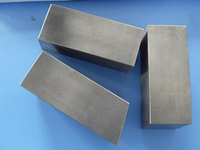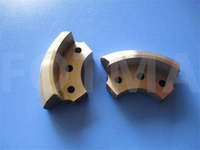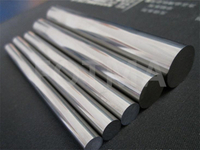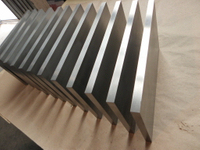Views: 2 Author: Site Editor Publish Time: 2022-10-24 Origin: Site
Alloy is a metal made by combining two or more metal elements, mainly to provide higher strength or corrosion resistance. Tungsten alloy family has many industrial applications due to its strength. Tungsten provides a unique contribution because it gives base metals exceptional strength, corrosion resistance and other useful properties. In addition to being an excellent alloying element, tungsten can also be used as the basis of its own alloys. This paper will focus on the basic categories of these tungsten alloys. The following are some details of the three most common tungsten alloys widely used in industry, including their properties and applications.
W-Ni-Fe
Tungsten nickel iron alloy is the most common tungsten alloy in terms of flexibility, strength and density. The tensile strength of these metals is between 600 and 1000 MPa, far exceeding most, if not all, of other alloys.
The most common tungsten alloy, tungsten nickel iron alloy, is among the best in ductility, strength and density. They are silver grey and have a density range of 16.85-19.3 g/cm3. These metals have a tensile strength range of 600-1000 MPa, which exceeds most, if not all, other alloys. These alloys have good processing quality and can withstand high temperature plasticity, while still having 5 times the thermal conductivity of die steel. Their radiation shielding capacity is 1.7 times that of lead, and they are non-toxic to biological systems (lead cannot be said that way). Iron makes these alloys magnetic. It is important to know whether they are suitable for any operation sensitive to magnetism, such as medical imaging equipment. Tungsten nickel iron alloy has low expansion coefficient and high elastic modulus that can be used for glass metal seals, which enables them to resist elastic deformation.
These alloys are ideal for radiation shielding because their high density matches their radiation resistance and are therefore ideal for protecting components. Some notable applications include counterweights, safety and defense applications, ballasts, bearing assemblies, etc.
Tungsten Nickel Copper Alloy
The nonmagnetic cousin of tungsten nickel iron alloy is tungsten nickel copper alloy. They are as popular as ferronickel, but generally have low tensile strength (500-700 MPa) and ductility. They are good electrical conductors and easy to process despite their high mechanical strength. They have excellent thermal stability and can shield radiation like other tungsten alloys. They are comparable to other tungsten alloys in terms of thermal stability and radiation resistance. Tungsten nickel copper alloy is a non-magnetic material. You can use it when tungsten nickel iron alloy has magnetic damage.
They are widely used in oncology tools, electronic sensor shielding, guidance system components and military technology. Because of its excellent density and strength, you can use heavy tungsten alloy for other ordnance.
Tungsten Carbide
Tungsten carbide (WC) is a kind of ceramic like compound, which is made by sintering process. Carbon black is added to tungsten powder to form a very hard and brittle cement after cooling. It can be a tungsten carbide (WC) or a tungsten carbide (W2C) matrix, each of which has unique characteristics, depending on the composition and manufacturing method. It is the most important tungsten compound, accounting for 60% of all tungsten applications.
Although tungsten carbide, once made, is difficult to handle, forge, machine, rotate or deform, it can resist wear, scratches, erosion, corrosion and extreme temperature changes.
Its service life is 100 times that of steel and its hardness is comparable to that of diamond. Tungsten carbide tools, because of their hardness, can easily cut almost any other material and be used at high speeds. Cutting tools, ammunition, mining and drilling, nuclear energy, leisure sports, medical equipment, jewelry and other applications are just a few of the many applications of tungsten carbide.





